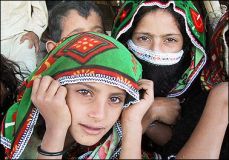East Sudanese frustrated at government neglect
By Opheera McDoom
KASSALA, Sudan, May 23 (Reuters) – Eastern Sudanese tribal leaders passionately decried the lack of development and the marginalisation of their region to a high-level government delegation in the eastern town of Kassala on Monday.

|
|
Children from the nomadic tribe of the Rashaidas from eastern Sudan they wait on a roadside with their parents for people to come buy their smuggled goods in Tesseney, western Eritrea. (AFP). |
East Sudan is one of many outlying regions of Africa’s largest country where residents complain of neglect at the expense of central Sudan around the capital Khartoum where most of the ruling elite hail from.
Similar accusations of central government neglect helped fuel a rebellion in the western Sudanese region of Darfur which has cost some 180,000 lives, mostly through hunger and disease. Analysts fear another conflict could now flare up in the east.
“We need your direct involvement here,” one sheikh, or tribal leader, shouted at the finance and agriculture ministers.
The ministers were part of a delegation of the ruling National Congress Party (NCP), which organised a conference of eastern tribal leaders to discuss development.
“We want to outline our plan of developing the east economically and socially,” said powerful Agriculture Minister Majzoub al-Khalifa, also the head of the NCP political secretariat.
The party’s plans include moving the headquarters of the organisations and agencies dealing with maritime issues to the poor eastern region, home to Sudan’s only sea port. It also proposes restarting talks with the armed rebel factions in the region and to build roads and infrastructure.
The head of the NCP, Ibrahim Ahmed Omar, told the conference that talking and negotiating was the only way to solve the problems in the east.
“Taking up arms and fighting only leads to destruction,” he said. “We welcome any opinion if it is a legal and peaceful one,” he added.
Kassala, with its stunning backdrop of rocky mountains overlooking the lush green banks of the river al-Gash, is close to the border with Eritrea. Relations between the two neighbours have been strained because of Eritrea’s support of rebels from both east and west Sudan.
The east suffers from regular drought and in parts has malnutrition rates higher than in the war-torn west and south.
Tribal leaders clamoured to vent their frustrations and at time came close to brawling with each other to take the floor.
“We don’t want all this political talk, we want the see the paper,” shouted one sheikh, annoyed at the lengthy speeches from his colleagues who seemed to all share the same points of view.
“The people here are not representative of all the sons of the east,” said another from the eastern Beja tribe. Others complained about the lack of services provided by the local governor, who is also the Kassala state president of the NCP.
Kassala resident Mohamed Abdel Gadir said this was not the first conference about the east, but it was the first time ministers seemed to be listening.
He said the ruling party was trying to shore up support in the post-peace multi-party era.
The former southern rebel Sudan People’s Liberation Movement signed a peace deal with the government in January to end more than two decades of civil war in the south.
“The SPLM are moving into government now and there’s competition for the National Congress, so they are having to move,” Abdel Gadir said.
The SPLM took control some areas of eastern Sudan during the southern civil war and enjoys support in the region.
